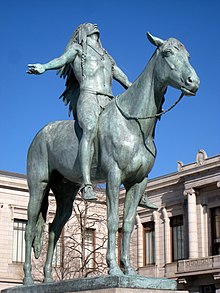
Back الروح العظيمة Arabic Μεγάλο Πνεύμα Greek Suuri Henki Finnish Grand Esprit French Grande Espírito Galician הרוח הגדולה HE Grande Spirito Italian 大いなる神秘 Japanese Grand Spirit LMO Grande Espírito Portuguese

| Part of a series on |
| Anthropology of religion |
|---|
 |
| Social and cultural anthropology |
The Great Spirit is an omnipresent supreme life force, generally conceptualized as a supreme being or god, in the traditional religious beliefs of many, but not all, indigenous cultures in Canada and the United States. Interpretations of it vary between cultures.
In the Lakota tradition, the Great Spirit is known as Wakan Tanka.[1][2] According to Lakota activist Russell Means, a more semantically accurate translation of Wakan Tanka is the Great Mystery.[3] Often, Lakota language prayers begin with the phrase “Tunkasila”, which translates to “grandfather, Great Spirit.”[4]
In the Haudenosaunee tradition, the Great Spirit is known as "the Creator". Haudenosaunee men's lacrosse team captain Lyle Thompson, characterized it as "the Creator that lives in all of us. It’s in the sun. It’s in the moon. It’s in the stars and the water. It’s in the earth."[5]
In the Algonquian tradition, the Great Spirit is known as Gitche Manitou.[6]
Due to perceived similarities between the Great Spirit and the Christian deity, European colonial missionaries drew comparison between the two deities as a Christianization conversion technique.[7]
- ^ Ostler, Jeffry. The Plains Sioux and U.S. Colonialism from Lewis and Clark to Wounded Knee. Cambridge University Press, July 5, 2004. ISBN 0521605903, pg 26.
- ^ Marks, M., & Fauteck, L. (2007). Great mysteries: Native North American religions and participatory visions. ReVision, 29(3).
- ^ Means, Robert. Where White Men Fear to Tread: The Autobiography of Russell Means. Macmillan, 1995. ISBN 0312147619 pg 241.
- ^ Fund, College (2008-12-15). "Honoring Our Elders | American Indian College Fund". collegefund.org. Retrieved 2024-09-06.
- ^ McDonald, Thomasi (2023, November 16) | Duke Today.Recapturing the Indigenous roots of lacrosse
- ^ Thomas, Robert Murray. Manitou and God: North-American Indian Religions and Christian Culture. Greenwood Publishing Group, 2007. ISBN 0313347794 pg 35.
- ^ References: Schoolcraft, Henry R. The Myth of Hiawatha and other oral Legends, Mythologic and Allegoric of the North American Indians. J.B. Lippincott & Co. 1856. Brehm, Victoria. Star Songs and Water Spirits, a Great Lakes Reader. Ladyslipper Press. 2011.